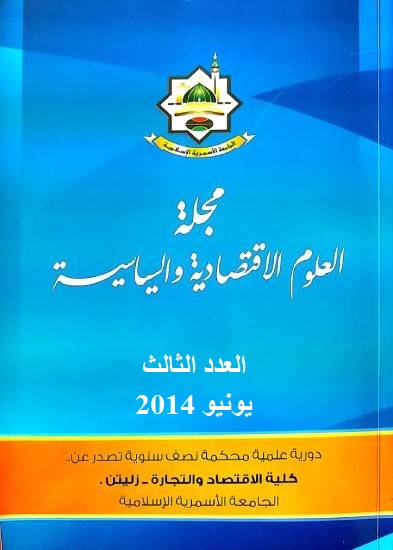التطور التاريخي لمفهوم استقلالية المراجع الخارجي ومعناها واهميته في المراجعة
الملخص
تعتبر استقلالية المراجع الخارجي من بين المواضيع التي نالت قسطاً كبيراً من الدراسة والتحليل في الأدب المحاسبي. لذلك يهدف هذا البحث إلى دراسة وتحليل أهم النواحي المتعلقة بمفهوم الاستقلالية من حيث تطوره ومعناه وأهميته في المراجعة، ولأجل تحقيق هذا الهدف تم تقسيم البحث إلى خمسة أجزاء رئيسة، خصص الجزء الأول لعرض الإطار العام للبحث، في حين حاول الجزء الثاني تتبع مراحل تطور مفهوم الاستقلالية. أما الجزء الثالث فقد ناقش طبيعة ومعنى مفهوم الاستقلالية، بينما وضح الجزء الرابع أهمية مفهوم الاستقلالية في المراجعة، وأخيراً خصص الجزء الخامس لعرض أهم النتائج والتوصيات المقترحة. وقد تبين من خلال النتائج أن مفهوم الاستقلالية تطور خلال المراحل العديدة التي مرت بها مهنة المحاسبة والمراجعة نتيجة للتغيرات الاجتماعية والاقتصادية، التي عايشتها المجتمعات البشرية. كذلك اتضح وجود مفهومين للاستقلالية هما: الاستقلالية الحقيقية والاستقلالية الظاهرية، حيث يشير المفهوم الأول إلى أمور تتعلق بالنواحي الفكرية للمراجع الخارجي كالنزاهة والاستقامة والموضوعية، في حين يشير المفهوم الثاني إلى مدى إدراك الأطراف الأخرى لهذه الاستقلالية. أيضا تبينت الأهمية الكبيرة لمفهوم الاستقلالية في توفير الثقة في التقارير المالية وفي الدور الذي تقوم به مهنة المراجعة في المجتمع.
المراجع
American Accounting Association (1973), (AAA) Committee on Basic Auditing Concepts, A statement of Basic Auditing Concepts. Sarasota, FI: AAA.
American Institute of Certified Public Accountants. (1991), AICPA professional standards, Volumes 1and 2, New York.
Aranya, N. and Sarell, M. (1975), “The auditor-firm conflict of interest: a comment”, the Accounting Review, October, pp. 854- 856.
Arens, A. Elder, R. J. and Beasley, M. S. (2003), “Auditing and Assurance Services”, Ninth Edition, Prentice Hall.
Auditing Practices Board, Ethical Standards (2004).
Bartlett, R. W. (1993), “A scale of perceived independence; new evidence on an old concept”, Accounting, Auditing & Accountability Journal, Vol. 6, No. 2, pp. 52-67.
Berryman, R. G. (1978), “Auditor independence: Its historical development and some proposals for research”, Ethics in the Accounting profession, Edit. Loeb, s, e. pp. 141-158.
Carey, J. and Doherty, W. O. (1966), “The concept of independence-review and restatement”, the Journal of Accountancy, January, pp. 38-48.
D’silva, K. (1992), “External auditor independence: Selected group perceptions”, Unpublished PhD thesis, City University, London.
Firth, M. (2002), “Auditor-provided consultancy services and their association with audit fees and audit opinions”, Journal of Business, Finance & Accounting, Vol. 29. No. 5/6. pp. 661-693.
Flint, D. (1988), “Philosophy and procedures of auditing: an introduction”, Macmillan, London.
Goldman, A. and Barlev, B. (1974), “The auditor-firm conflict of interests: Its implications for independence”, the Accounting Review, Vol. 49, No. 4, pp. 707-718.
Institute of Chartered Accountants of England and Wales (ICAEW). (1997), Guide to Professional Ethics, “Integrity, Objectivity and Independence”, Institute of Chartered Accountants in England and Wales.
International Federation of accountants (IFAC). (2005), Independence – Assurance Engagements, Code of Ethics for professional Accountants, IFAC, New York, NY.
Kazas, V. (1991), “Structure and function of the auditing profession in Greece”, Unpublished M. Phil dissertation, Bradford University.
Kilcommins, M. (1997), “Perceptions of auditor independence and the effects on the perceived reliability of financial statements in Ireland”, Unpublished PhD thesis, University of Wales, Aberystwyth.
Mautz, R. K. and Sharaf, H. A. (1961), “The Philosophy of Auditing”, American Accounting Association, New York.
Millichamp, A. And Taylor, J. (2008), “Aiditing”, SouthWestern Cengage Learning, 9 Edition, UK.
Nichols, D. and Price, K. H. (1976), “The auditor-firm conflict: an analysis using concepts of exchange theory”, the Accounting Review, Vol. 51. No. 2, pp. 335-346.
Oxford Dictionary and Thesaurus (2001), Ellictt, J. (ed.), Oxford University Press Inc, New York.
Pany, K. and Reckers, P. M. (1983), “Auditor independence and non-audit services”, Journal of Accounting and Public Policy, Vol. 2. pp 43-62.
Porter, B. Simon, J. and Hatherly, D. (2004), “Principles of external auditing”, Wiley, Chichester.
Rahman, R. (1996), “Audit expectations gap in the public sector of Bangladesh”, Unpublished PhD thesis, Dundee University, UK.
Sarbanes-Oxley Act (2002).
Soltani, B. (2007), “Auditing an international approach”, Prentice Hall.
Sucher, P. and Bychkova, S. (2001), “Auditor independence in economies in transition: a study of Russia”, the European Accounting Review, Vol. 10, No. 4, pp. 817-841.
Sutton, M. H. (1997), “Auditor independence: The challenge of fact and appearance”, Accounting Horizons, Vol. 11, No. 1, pp. 86-91.
Vanasco, R. R. (1996), “Auditor independence: An international perspective”, Managerial Auditing Journal, Vol. 11, No.9, pp. 4-48.
Watts, R. L. and Zimmerman, J, L. (1983), “Agency problems, auditing, and the theory of the firm: Some evidence”, Journal of Law and Economics, Vol. 26, No. 3, pp. 613-633.
Wines, G. (2006), “The connotative meaning of independence in alternative audit context: An exploratory study”, Pacific Accounting Review, Vol. 18, No. 1, pp. 90-122.
التنزيلات
منشور
إصدار
القسم
الرخصة
الحقوق الفكرية (c) 2014 مجلة العلوم الاقتصادية والسياسية

هذا العمل مرخص بموجب Creative Commons Attribution 4.0 International License.





